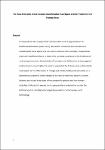The rural enterprise crime complex: ‘undefendable rural space’ and the threat from the fortress farm
| dc.contributor.author | Goodall, O | |
| dc.date.accessioned | 2024-01-31T16:19:09Z | |
| dc.date.available | 2024-01-31T16:19:09Z | |
| dc.date.issued | 2023-09 | |
| dc.identifier.issn | 0925-4994 | |
| dc.identifier.issn | 1573-0751 | |
| dc.identifier.uri | https://pearl.plymouth.ac.uk/handle/10026.1/21984 | |
| dc.description.abstract |
In response to the concept of the ‘fortress farm’ and its appropriation of traditional defensible space theory, this article introduces the conditions of undefendable rural space and the rural enterprise crime complex. Perspectives that invert traditional theory to determine contexts conducive to the incidence of rural enterprise crime. Empirical data from extensive fieldwork on crimes against wild animals in rural England is used to argue that the fortress and undefendable rural space can in effect serve to ‘design-out’ crime control and lock crime in. A dichotomous outcome, which creates a fortress for relatively powerful human insiders and a rural enterprise crime complex for persecuted non-human outsiders. A biocentric species justice perspective is adopted to counter the anthropocentric paradigm that arguably prevails in contemporary rural criminology. | |
| dc.format.extent | 215-235 | |
| dc.language | en | |
| dc.publisher | Springer Science and Business Media LLC | |
| dc.subject | Rural | |
| dc.subject | Wildlife crime | |
| dc.subject | Species justice | |
| dc.subject | Poaching | |
| dc.title | The rural enterprise crime complex: ‘undefendable rural space’ and the threat from the fortress farm | |
| dc.type | journal-article | |
| dc.type | Article | |
| plymouth.author-url | https://www.webofscience.com/api/gateway?GWVersion=2&SrcApp=PARTNER_APP&SrcAuth=LinksAMR&KeyUT=WOS:000928926400001&DestLinkType=FullRecord&DestApp=ALL_WOS&UsrCustomerID=11bb513d99f797142bcfeffcc58ea008 | |
| plymouth.issue | 2 | |
| plymouth.volume | 80 | |
| plymouth.publisher-url | http://dx.doi.org/10.1007/s10611-023-10084-z | |
| plymouth.publication-status | Published | |
| plymouth.journal | Crime, Law and Social Change | |
| dc.identifier.doi | 10.1007/s10611-023-10084-z | |
| plymouth.organisational-group | |Plymouth | |
| plymouth.organisational-group | |Plymouth|Faculty of Arts, Humanities and Business | |
| plymouth.organisational-group | |Plymouth|REF 2021 Researchers by UoA | |
| plymouth.organisational-group | |Plymouth|Users by role | |
| plymouth.organisational-group | |Plymouth|Users by role|Academics | |
| plymouth.organisational-group | |Plymouth|REF 2021 Researchers by UoA|UoA18 Law | |
| plymouth.organisational-group | |Plymouth|Faculty of Arts, Humanities and Business|School of Society and Culture | |
| plymouth.organisational-group | |Plymouth|REF 2028 Researchers by UoA | |
| plymouth.organisational-group | |Plymouth|REF 2028 Researchers by UoA|UoA18 Law | |
| dcterms.dateAccepted | 2023-01-25 | |
| dc.date.updated | 2024-01-31T16:19:09Z | |
| dc.rights.embargodate | 2024-2-7 | |
| dc.identifier.eissn | 1573-0751 | |
| rioxxterms.versionofrecord | 10.1007/s10611-023-10084-z |


